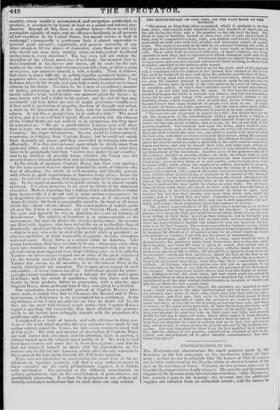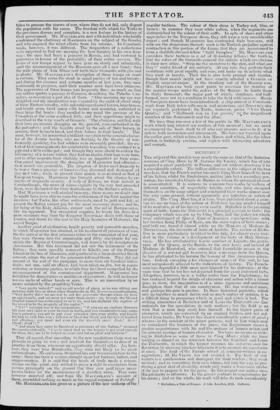CONSTANTINOPLE IN 1828.
MR..MACFARLANE characterizes the small progress made by the Russians, in the last campaign, as the mysterious failure of their army ; so that we are to conclude that the causes of their ill success are as little understood by the Franks within so short a distance of the spot as by ourselves at home. Certainly no two powers were ever so imperfectly prepared for a deadly struggle. The poverty and ill-arranged supplies of the Russian army have become notorious, while MAHMOOD has scarcely a para in his treasury : his revenue and the additional supplies are extorted from an exhausted people ; and the means he
takes to procure the sinews of war, where they do not fail, only disgust the population with his cause. The freedom with which the Turks in the provinces discuss and complain, is a new feature in the history of their government. Mr. AlACFARLANE met with individuals who loudly condemned the obstinacy of MAHMOOD on the subject of the Greeks,
and who augured the worst elects from his reforms. In Constanti- nople, however, it was different. The frequenters of a coffeehouse were surprised to find one morning the host hanging in his own door- way: the man had been a prisoner in Russia, and had ventured to pronounce in favour of the probability of their entire success. The levies of new troops appear to have gone on slowly and reluctantly, until the mismanagement of the Russians gave all a new heart : then the wide plains of Asia Minor sent forth their Osmanlis with glee and in plenty. Mr. MAcreutaANE's description of these troops en route is curious. They cross the strait in small parties of ten and twenty ; anti during the summer and autumn months of last year, they were continually in progress, until their number .arust have been immense. The appearance of these troops was frequently fine ; so much so, that our author quotes a passage in GIBBON, describing the Paladin Cru- saders, as conveying a just idea of them. " One morning my eye was delighted and my imagination was warmed by the sight of about sixty of these Eastern cavalry, with splendid caparisoned horses, long lances, and bright arms (and many with helms and corslets), embarked in three large at boats : they recalled to my mind the passage of the Crusaders at the same confined frith, and their appearance might be described in the very words of GIBBON: The chargers, saddled, with their long caparisons dragging on the ground, were embarked in the flat pulanders ; and the knights stood by the side of their horses, in
armour, their helmets laced, and their lances in their hands.'" This must, however, be accounted a brilliant exception to the general charac- ter of the Asiatic hordes, who are flocking to the theatre of war. Generally speaking, the foot soldiers were miserably provided t the ex- tent of their arrangements for comfortable travelling was confined to a pipe and a little coffee-pot ; and though they Were about to endure the inclemency of a severe winter, they had no cloaks, their legs were bare, and in other respeets their clothing was as imperfect as their arms. One grand improvement the discipline of MaeomooD had effected— their march was peaceable. The progress of levies used formerly to he Ivoree than a passage of' locusts—they devoured and destroyed all they met with ; while at present their march is as civilized as that of European troops. MAHMOOD has brought about the change by ex- amples of desperate severity. A body of Zebecs, on their arrival in Constantinople, the news of whose exploits by the way had preceded them, \vete decimated for their disobedience to the Sultan's orders.
Had Mar-moon a Ivell-stocked treasury, there seems no doubt that he might have been able to rouse the enthusiasm of the East against the invaders : but Turks, like other enthusiasts, must be paid and fed: at present the Sultan cannot pay for the most necessary stores ; and he, not being of the Holy Alliance, cannot seek the aid of Rotruscunn, like his opponent. For occasional supplies, he treats his Jews in a more summary way than the Emperor NICHOLAS deals with those of London, and trusts for the rest to the Holy Breeches of Mahomet, the sacred Sanjac.
Another point of civilization, beside poverty and peaceable marches, to which MAI-moon has attained, is his treatment of prisoners of war. On the arrival of the first prisoners taken in the campaign of last year, they were thrown into the abominable and filthy receptacle for cri- minals the Baguio at Constantinople, well known by its description in rlitaata,sias. But this treatment did not suit the refinement of the Sultan ; they vere speedily removed to Khalki, one of the Princes' Islands in the Sea of Marmora, and quartered in a large deserted Greek convent, where the rest of the prisoners followed them. They did not amount at the end of the campaign to more than six hundred indivi- duals: not one, said an officer, had been taken au feu, but in recon- noitering or foraging parties, to which they had been compelled by the mismanagement of the commissariat department. MAHMOOD has forbidden the decapitation or mutilation of prisoners ; he will no longer receive sacks of either heads or ears. This is an innovation by no means relished by the grumbling Turks.
"Very pretty indeed!" said an old vender of pipes, as he was sitting one
morning with two or three other Stamboolis in Mr. Z s countinghouse,
"Very pretty this ! we are not to cut the pezarenks' throats when we have an opportunity, and we must not make them slaves no, though the blessed Prophet himself has authorized us so to do, and has declared the captive of the sword to be the property of the captor."
" No ! " rejoined one of his companions ; " if you see an unclean Muscove kill your very child or your brother in battle, and you should afterwards make
him a prisoner, you are to put your yataghan into your girdle, and kindly tell him to walk this way ; talk not of blood for blood, and the ties of kindred and affection; you must not even slit the Karate's ears ! Bosh! Bsh (Stuff! Stuff ! ) "
"And when they come to Stambool as prisoners of the Sultan," resumed the caustic chibookji, " I understand that as the bagnio is not good enough for them, they are to be lodged in serais and fed on pilaff and kibaubs."
They all rived, that according to the new regulations there was no pleasure in going to war ; and resolved for themselves to dissent in practice from them, whenever an opportunity should offer. As, how- ever, they were true Stamboolis, they were not likely to be great cutters of ears. Nevertheless, Stamhool has sent her conscription to the army : there has been a serious draught upon her barbers, tailors, and slipper-venders. It is said that the heads of trade made a remon- strance on this point, anti wished to prove a right to exemption from service, principally on the ground that they now paid taxes never known before for the maintenance of a standing army. They were however marched off; and from Mr. MACFARLANE'S account of them, resembled nothing so much as the ragged regiment of Fa/8/(dt:
Mr. MACITARLANE has given us a picture of the new uniform of the
regular tacticos. The colour of their dress is Turkey red, blue, or brown : in summer they wear white cotton, when the regiments are distinguished by the colour of their cuffs. In spite of shoes and other approaches to the European dress, they still wear a very unsoldierlike aspect ; and though MAiimoon has contracted their trowsers, still wide are the dimensions thereof: such is the Turkish prejudice against contraction in this portion of the frame, that they are accustomed to term a shabbily-dressed fellow "tight breeches." Mr. MACFARLANE considers these tacticos as a set of ill-looking fellows : the truth is, that the robes of the Osmanlis conceal the defects which are obvious in their new attire. " Strip me the monsters to the skin, and what are they ?" said a friend of our author's. At any rate, they perform their evolutions with great rapidity and ease, and make up in activity what they want in beauty. Their fire is also both prompt and regular, though their march might not have exactly satisfied a German or English sergeant-major. At the breaking out of the Russian war, Mr. MACFARLANE took great pains to ascertain the number of the regular troops under the orders of the Sultan : he limits them to thirty thousand ; the major part of which, striplings, and half- formed, were not in a condition to take the field with success. Bands of European music have been introduced: a ship arrived at Constanti- nople from Italy laden with music and musicians, and Rossi sa's airs are regularly performed: the Turks, however', prefer " live Henri Quatre," and " Malbronk s'en va, fen guerre," to, the magnificent marches of the Seminunide and the Most'.
We have thus run over a few of the points in Mr. MACFARLANE'S work which may interest our readers at this moment ; but we must recommend the book itself to all who can procure access to it : it is rich in both instruction and amusement. We have not touched upon the earlier part, which relates to Asia Minor, and which, like the latter portion, is strikingly curious, and replete with interesting adventure and remark.



















 Previous page
Previous page